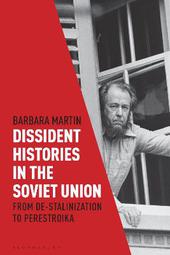
|
Dissident Histories in the Soviet Union: From De-Stalinization to Perestroika
Paperback / softback
Main Details
| Title |
Dissident Histories in the Soviet Union: From De-Stalinization to Perestroika
|
| Authors and Contributors |
By (author) Dr. Barbara Martin
|
| Series | Library of Modern Russia |
|---|
| Physical Properties |
| Format:Paperback / softback | | Pages:312 | | Dimensions(mm): Height 234,Width 156 |
|
| ISBN/Barcode |
9781350192447
|
| Classifications | Dewey:947.0072 |
|---|
| Audience | | Professional & Vocational | |
|---|
| Illustrations |
5 bw illus
|
|
Publishing Details |
| Publisher |
Bloomsbury Publishing PLC
|
| Imprint |
Bloomsbury Academic
|
| Publication Date |
25 February 2021 |
| Publication Country |
United Kingdom
|
Description
How was it possible to write history in the Soviet Union, under strict state control and without access to archives? What methods of research did these 'historians' - be they academic, that is based at formal institutions, or independent - rely on? And how was their work influenced by their complex and shifting relationships with the state? To answer these questions, Barbara Martin here tracks the careers of four bold and important dissidents: Aleksandr Solzhenitsyn, Roy Medvedev, Aleksandr Nekrich and Anton Antonov-Ovseenko. Based on extensive archival research and interviews (with some of the authors themselves, as well as those close to them), the result is a nuanced and very necessary history of Soviet dissident history writing, from the relative liberalisation of de-Stalinisation through increasing repression and persecution in the Brezhnev era to liberalisation once more during perestroika. In the process Martin sheds light onto late Soviet society and its relationship with the state, as well as the ways in which this dissidence participated in weakening the Soviet regime during Perestroika. This is important reading for all scholars working on late Soviet history and society.
Author Biography
Barbara Martin is Research Associate at the Pierre du Bois Foundation, Switzerland. She has published a number of articles in peer-reviewed journals (including Slavic Review) and has co-edited a book on the dissident historical journal Pamiat', published in Russian.
ReviewsThis is a welcome and long overdue study ... For Martin these works were more than acts of protest. They are testaments to historical memory. * The Russian Review * Precise and illuminating. * Times Literary Supplement * This is an impressive piece that is a recommended read to anyone with an interest in political dissent, intellectual history, or life in the Soviet Union. * European History Quarterly * This wonderful new book by Barbara Martin acts as a mediator from that gateway text to many other robust, fascinating de-Stalinization era authors. Not only that, it offers insight into the post-Stalin period up to Gorbachev's perestroika, as well as the ever-changing public opinion both inside and outside Russia. * Lossi 36 * [A] well-written, timely micro-history of the careers and fates of four chief protagonists, Anton Antonov-Ovseenko, Roy Medvedev, Aleksandr Nekrich, and Aleksandr Solzhenitsyn. * International Review of Social History * Barbara Martin's new book on Soviet 'Dissidents' deserves to be read and re-read. * Europe-Asia Studies * Barbara Martin's meticulously researched, lucid account offers the first ever comparison of the four leading 'unofficial' historians of the late Soviet Union. Full of fascinating biographical detail and richly nuanced in its analyses of these historical texts and their authors, Martin's book will be essential reading for historians of late socialism, dissent and the politics of historical writing. * Polly Jones, Associate Professor in Russian, University College, University of Oxford, UK * This book is a major contribution to our understanding of the dissident phenomenon in the former Soviet Union. Diligently researched and drawing on a vast repository of archival material, Barbara Martin sheds new light on the nature of Soviet dissidence, beyond the cliched binary of dissidents versus the state. Above all, Martin reminds us of the crucial role of Stalinist history in legitimating the Soviet state, and conversely of dissident history in delegitimating it. * Roger D. Markwick, Professor of Modern European History, The University of Newcastle, Australia *
|